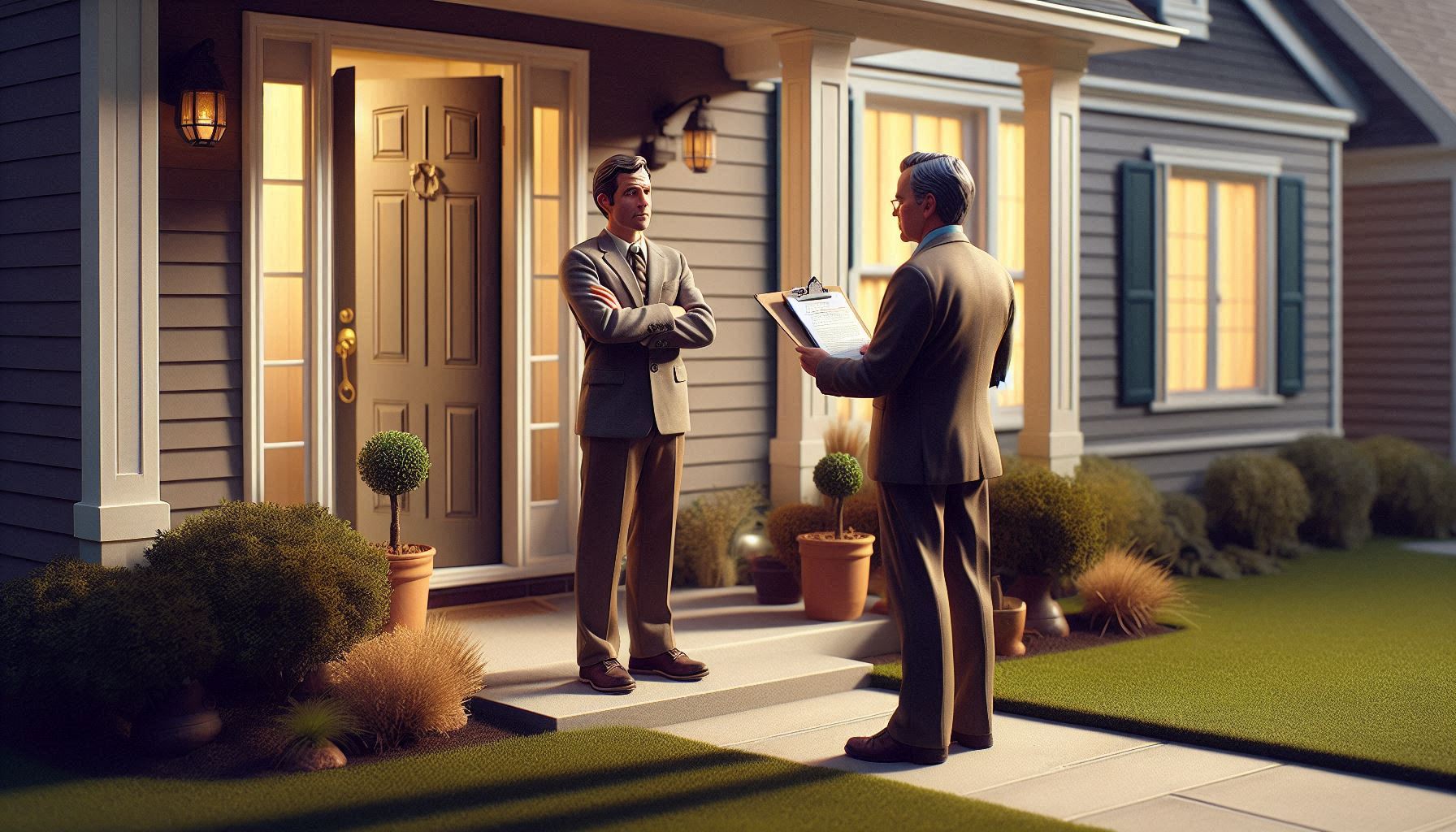When I bought my first home, I was both excited and overwhelmed by the many responsibilities that came with homeownership. One of the things that caught me off guard was the request for a home insurance inspection. I wasn’t sure what to expect or whether I could refuse the inspection altogether. The question kept nagging at me: “Can I refuse a home insurance inspection?”
It’s an important question, and honestly, the answer isn’t as simple as it may seem. While it’s technically possible to refuse an inspection, doing so comes with significant consequences. Whether you’re a first-time homebuyer or a seasoned property owner, understanding the process and implications of home insurance inspections is crucial. I’d love to share my personal experience and insights with you, taking you through everything you need to know about home insurance inspections, their importance, and what happens if you refuse one.

What is Home Insurance Inspection?
A home insurance inspection is the evaluation conducted by your insurance provider or one they have contracted for the purpose of gauging the condition of your home in order to determine risks that could affect your coverage. Generally, the inspection will be done to determine whether the home is in proper condition and if the policy accurately reflects the property’s value and risk factors.
In the course of inspecting, he will generally check for several points, such as:
Structural Integrity
Examining foundation, walls, and roof to determine whether the property is safe and secure.
Plumbing and Electrical Systems
Ensure that all parts are up to the codes and operating efficiently to avoid problems in the future.
Fire Hazards
Factors to be checked are faulty wiring, outdated home appliances, and other fire hazards.
Security Risks
Vulnerabilities such as unlocked windows or poor lighting.
Other Risks
Other features such as pools, trampolines, or even detached garages that might expose the insurance to potential risks.
Why Do Insurance Companies Require Inspections?
As taught by my own home buying experience, home insurance inspections are essential for both the homeowner and the insurance company. They help ensure that both parties are adequately protected. Here’s why insurance companies require inspections:
To Assess Risk
Insurance firms need to analyze the hazards related to insuring a property. A well-maintained home with updated plumbing, a secure roof, and no significant fire hazards is less hazardous to insure. The inspection helps them know whether the home is a high-risk or low-risk investment.
For Determining Correct Premiums
Once the risks are assessed, insurers use the inspection data to set your premiums. Homes with greater risk–such as an older roof or outdated electrical systems–will most likely require higher premiums. Homes that are better taken care of might benefit from lower rates.
To Prevent Future Losses
Most home insurance claims come from things that, if caught early, could have been avoided. For instance, an underwriter may find a roof leak that could possibly cause future water damage. Early detection of such issues can help the underwriter and homeowner avoid major claims in the future.
To Inspect the Condition of the Home
Sometimes, when the homeowner applies for insurance, he does not have an accurate representation of his home’s condition. Inspection helps verify everything that may relate to the quality of the roof to the overall safety of the property. It ensures that the policy accurately reflects the current state of the property.
Can I Refuse a Home Insurance Inspection?
This is where things get tricky: Can I refuse a home insurance inspection? Yes, technically, you can refuse a home insurance inspection. But should you? Refusing an inspection could have serious consequences, and that’s something I quickly realized when I looked deeper into the issue.
What Happens If You Refuse the Inspection?
The effect of refusing a home insurance inspection, however, differs according to your insurance company, policy, and type of home. Some of the possible consequences after refusing the inspection are as follows:
Policy Cancellation
Perhaps the most obvious consequence of a refusal is cancellation by your insurer. If an inspection is a required component of your contract, denial of an inspection can also result in having your coverage terminated.
Non-Renewal
If you decline the inspection and have an existing insurance policy, your insurer might not decide to renew the coverage once the term ends. This means you will have to seek another insurance company, which is much more difficult if other insurers consider your refusal a red flag.
Higher Premiums
Even if your policy is not cancelled, you may face increased premiums if you decline an inspection. Insurers perceive an uninsured house as a greater risk, as they are not allowed to verify the condition of your home, and so increase your premiums.
Limited Claims Approval
If a problem could have been discovered during the inspection, like leaky pipes or a roof leak, your insurer may deny your claim. This is quite a large risk since some issues that will lead to a claim, like water damage, might not come up until much later.
Reasons You May Decide to Decline an Insurance Inspection
While I personally chose to go along with the inspection, most homeowners may find themselves asking for not going through with it. Here are some reasons why you might say no to the inspection:
Privacy Concerns
Some homeowners might be uneasy about the prospect of someone inspecting their property. If the inspection requires entry to your home, this might be an invasion of privacy, particularly when a personal space like your basement or attic needs to be visited by the inspector.
Discomfort with the Process of Inspection
Occasionally, the homeowner disagrees with the methodology employed. If he or she finds the inspector to be too thorough or invasive, the homeowner may feel that this inspection is too costly or unnecessary.
Read More:
- Home Insurance Received Cancellation Letter But They Never Cancelled
- How to Email Cancellation Home Insurance Mentioning Reason
- How to Choose an Insured Home Inspector
Undesirable Additional Costs
If your insurer requires an inspection for policy renewal or for any upgrades, you might feel that it’s a no-brainer given that you haven’t made a single change to the property. Some inspections come with an out-of-pocket cost that might not seem necessary to some homeowners.
Distrust Towards Companies
Some homeowners are rather suspicious of insurance companies and may think that the inspection is just a way to figure out how to boost up premiums or deny claims.
What Kinds of Inspections Are Usually Necessary?
When my insurer scheduled an inspection, I wasn’t quite sure what to expect. Here’s a breakdown of the different kinds of inspections that might be necessary, depending on the policy and the circumstances:
1. Pre-Binding Inspection
This is usually done before the activation of your insurance policy. It assesses the risk factors of the home and determines if the insurer is willing to take the risk associated with insuring that property. For instance, they would check for something like an outdated plumbing or electrical system.
2. Renewal Inspection
Renewal inspection may be possible for homeowners with a continuing policy. This is especially the case for an expensive property, homes that had claims, or homes that have changed much or are under renovation.
3. Inspection Post Claim
Sometimes, after a claim has been lodged, an inspection is required to establish if the given damage is real and if the claimant is telling the truth. It helps one avoid fraudulent claims and ensures that the damage is of the stated kind.
4. Internal Inspection
Some insurance companies will concentrate solely on the home’s interior. They might look at the HVAC system, plumbing, wiring, and safety features overall. This is usually the case when the home is quite old or the property is a repeat offender in terms of claims.
5. Exterior Inspection
An inspection of the outer components of a home involves the roof, siding, foundation, and other elements visible on the house. It helps the insurers decide about the likelihood of damage due to weather, aging, or environmental factors.

Home Insurance Inspections Types Table
| Type of Inspection | Purpose | Timing |
|---|---|---|
| Pre-Binding Inspection | Check the condition and risks of the home | Prior to policy activation |
| Renewal Inspection | Detect changes or new risks | At the time of policy renewal |
| Post-Claim Inspection | Confirm damage and claims | At the time of filing a claim |
| Internal Inspection | Focus on plumbing, wiring, and safety | Anytime during the policy period |
| Exterior Inspection | Evaluate the condition of the home’s exterior | Before issuing or renewing a policy |
10 Types of Coverage You Need in Home Insurance
With inspections out of the way, let’s look at the different types of coverage you should consider when obtaining a home insurance policy. These coverages will protect you in the event of disaster by providing financial relief:
1. Dwelling Coverage
Protects the structure of your home from fire, storms, and other covered perils.
2. Personal Property Coverage
Covers your belongings, such as furniture, electronics, and clothing, in the event of theft, fire, or other damage.
3. Liability Coverage
Covers legal and medical costs if someone gets injured on your property.
4. Loss of Use Coverage
Pays for living expenses if you’re unable to live in your home after it’s damaged by a covered peril.
5. Flood Insurance
Flooding is generally not included in regular policies, so you may need an additional flood insurance policy.
6. Earthquake Insurance
Not all policies insure against earthquakes, so it is an optional rider to include for homeowners in earthquake-prone regions.
7. Other Structures Coverage
This covers detached structures such as garages, fences, and sheds.
8. Water Backup Coverage
Protects you from damages caused by a sewer backup and can lead to significant water damage.
9. Medical Payments Coverage
This pays medical bills if someone is injured on your property regardless of fault.
10. Umbrella Insurance
Offers extra coverage beyond your basic home insurance policy to cover major disasters.
Conclusion
So, can you refuse a home insurance inspection? Yes, but it’s usually not a wise move. Refusing an inspection can lead to consequences like higher premiums, policy cancellation, and potential claim denials. While it’s not always convenient to go through the process, it’s in your best interest to comply with the inspection requests to ensure that your home insurance policy truly reflects the risk associated with your property.
As I’ve learned through my own journey, insurance inspections help ensure that your home is adequately protected from the unexpected. In the end, they provide both peace of mind and a financial safety net. If you’re ever faced with an inspection request, it’s best to cooperate so that you can continue to enjoy the security of your home insurance policy.
FAQs
1. Can I refuse a home insurance inspection?
Yes, you can technically refuse a home insurance inspection, but it is generally not recommended. Refusing the inspection can lead to higher premiums, policy cancellation, or even claim denials.
2. What happens if I refuse the inspection?
If you refuse the inspection, your insurance company may cancel your policy, choose not to renew it, or increase your premiums. Additionally, future claims may not be honored if they could have been detected during the inspection.
3. Why do insurance companies require inspections?
Insurance companies conduct inspections to assess risks, determine the correct premium rates, prevent future losses, and ensure that the home is accurately represented in the policy.
4. Can an inspection affect my insurance premiums?
Yes, the results of a home insurance inspection can influence your premiums. If the inspection reveals risks such as an old roof or outdated plumbing, you may face higher premiums to cover the potential damage or loss.
5. What types of things are checked during a home insurance inspection?
The inspector will typically check for structural integrity, plumbing and electrical systems, fire hazards, security risks, and any other factors that may influence the risk of insuring the home.
6. Are there any reasons I might refuse an inspection?
Some homeowners might refuse an inspection due to privacy concerns, discomfort with the process, distrust of insurance companies, or the belief that an inspection is unnecessary if there have been no significant changes to the home.
7. Is a home inspection the same as a home appraisal?
No, a home inspection is an evaluation of the property’s condition, while a home appraisal determines the property’s market value. Inspections are typically required for insurance purposes, whereas appraisals are used for buying, selling, or refinancing.
8. How often are home insurance inspections required?
Home insurance inspections are typically required when you first purchase the home or when renewing your policy. Some insurers may also request inspections after a claim has been filed or when there are major renovations to the property.
9. Can I choose the company that performs the inspection?
Typically, the insurance company will hire a third-party inspector. While you can sometimes request a specific inspection company, the insurer generally chooses the vendor to ensure an unbiased evaluation.
10. What coverage types should I consider for home insurance?
Key coverage types include dwelling coverage, personal property coverage, liability coverage, flood insurance, earthquake insurance, and medical payments coverage. Ensure that your insurance policy adequately protects your home and belongings.


